Showing 21-40 of 50 results
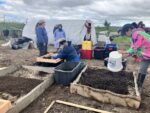 western.sare.org news training-ag-leaders-in-the-bering-strait
western.sare.org news training-ag-leaders-in-the-bering-strait Training Ag Leaders in the Bering Strait
A large nonprofit with a long history in Alaska, the Rural Alaska Community Action Program (CAP) is well-known for its work addressing housing, workforce development, and health challenges. When COVID hit, the organization added food security work to their priorities. With the Coronavirus Aid, Relief, and Economic Security (CARES) Act funding, they initiated ten food […]
Funded Projects
At their March 2025 meeting, the Administrative Council approved funding for 86 projects. The total amount of funding is over $7.9 million. Projects were funded in 14 states and territories. Funding included:
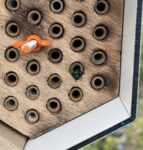 western.sare.org news can-introducing-mason-bees-boost-berry-pollination
western.sare.org news can-introducing-mason-bees-boost-berry-pollination Can Introducing Mason Bees Boost Berry Pollination?
When it comes to berry pollination throughout the West, honeybees are the biggest show in town. That can be a problem for pollination diversity and for farmers because honeybees aren’t always the best option for some crops. “That’s especially true with blueberries,” said Miranda Jones, a graduate student in biology at Utah State University. “Blueberries […]
 western.sare.org news the-terroir-of-bison
western.sare.org news the-terroir-of-bison The Terroir of Bison
Is Grass-Fed Bison Better for your Health? Not all bison burgers are created equal. As with other livestock, it stands to reason that how and where bison are raised would impact the meat’s nutritional profile. But there isn’t much science on how different forages and finishing strategies effect bison quality. Until now. Nutrition science […]
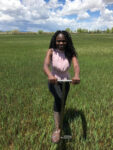 western.sare.org news biofertilizers-in-high-elevation-meadows
western.sare.org news biofertilizers-in-high-elevation-meadows Biofertilizers in High Elevation Meadows
Livestock producers in the high elevation areas of Wyoming and Colorado depend on hay meadows for their forage production. Because of limited precipitation and low fertility, producers have routinely practiced flood irrigation in these meadows and apply high rates of nitrogen fertilizer to guarantee sufficient production. Yet, these integral meadows are underperforming, expensive to manage, […]
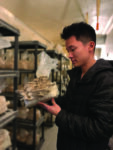 western.sare.org news from-vertical-farms-to-outer-space
western.sare.org news from-vertical-farms-to-outer-space From Vertical Farms to Outer Space
Research projects can at times lead to unanticipated results. While working to identify an alternative and sustainable source of carbon dioxide (CO2) generation for enriching plant chambers within the growing vertical farming industry as a graduate student at the University of Arizona, Justin Chung discovered the potential benefits for sustaining astronauts in long duration missions. […]
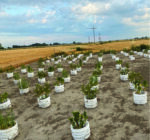 western.sare.org news idaho-student-researchers-work-to-eradicate-pale-cyst-nematode
western.sare.org news idaho-student-researchers-work-to-eradicate-pale-cyst-nematode Idaho Student Researchers Work to Eradicate Pale Cyst Nematode
When the pale cyst nematode, Globodera pallida, was discovered in southeastern Idaho in 2006, potato exports in Idaho and the United States were severely impacted. The nematode, which can devastate a potato crop, is a quarantine pest regulated by U.S. Department of Agriculture’s Animal and Plant Health Inspection Service. The Idaho infestation is found within […]
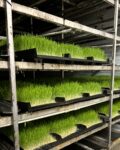 western.sare.org news grow-your-own-testing-the-benefits-and-economics-of-feeding-sprouted-grains
western.sare.org news grow-your-own-testing-the-benefits-and-economics-of-feeding-sprouted-grains Grow Your Own: Testing the Benefits and Economics of Feeding Sprouted Grains
A few wet winters haven’t dimmed memories of the severe drought Utah cattle producers – and producers around the West – lived through over several years. “A whole bunch of producers had to downsize their herds because there wasn’t pasture for their cattle and hay was so expensive,” said Kara Thornton-Kurth, an associate professor in […]
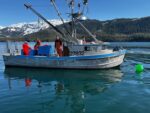 western.sare.org news can-kelp-be-alaskas-new-agricultural-frontier
western.sare.org news can-kelp-be-alaskas-new-agricultural-frontier Can Kelp be Alaska’s New Agricultural Frontier?
Alaska is relatively new to the business of farming kelp, a type of seaweed gaining popularity across the globe because it’s healthy for humans and good for the planet, too. Kelp is rich in vitamins, minerals and protein, requires no soil or fertilizers to grow, provides habitat for fish, and balances ocean acidification caused by […]
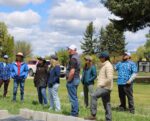 western.sare.org news exploring-montana-agriculture
western.sare.org news exploring-montana-agriculture Exploring Montana Agriculture
The SARE Fellows trip to Montana was amazing. I enjoyed seeing the collaborative efforts among the various farms and organizations to share their knowledge, expertise, and resources to help each other thrive while meeting the needs of the community. This experience has shown me how people working together is what truly makes programs sustainable. – […]
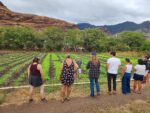 western.sare.org news building-bridges-across-the-pacific
western.sare.org news building-bridges-across-the-pacific Building Bridges Across the Pacific
Collaboration, education, and community empowerment hold potential for driving positive change. Accordingly, Regional Food Business Centers in Hawaiian, Pacific Island, and Alaskan communities are harnessing their skills and resources to reach their shared vision of resilient, sustainable, and self-reliant local food systems. Geographic isolation, food transit logistics, large Indigenous populations, underdeveloped infrastructure, extreme climate change […]
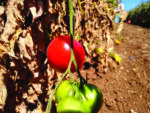 western.sare.org news rediscovering-dry-farming
western.sare.org news rediscovering-dry-farming Rediscovering Dry Farming
Climate change poses a serious challenge to Western farmers. How do you grow crops profitably when rainfall and drought are becoming so unpredictable and extreme? For many producers, dry farming may offer a way forward. Instead of relying on surface irrigation throughout the summer, dry farmers are finding ways to capture water from winter rains […]
Western SARE Funds Over $7.7 million in 2024
Western SARE’s Administrative Council has approved $7,765,941 for 82 projects throughout our region. Projects under seven different programs were funded: “Unlike the larger USDA grants programs, Western SARE provides support for small to moderate sized family farms and ag marketing enterprises, says Regional Coordinator Clayton Marlow. “ A quick glance at the 2025 funded projects […]
Promoting Water Recycling in Nurseries
One way to use water more efficiently is to use it twice. That’s the idea behind a Professional Development Project grant in Utah to promote water recycling in the state’s nursery industry. “I came here from Michigan and it’s a common practice to recycle water in nurseries there and on the eastern seaboard,” explained Utah […]
Farming and Food Narrative Project
Farmers know farming is a complex endeavor with competing demands and economic pressures. The non-farming public thinks farming is hard labor but otherwise simple. Farmers know that crop-destroying pests take the form of insects, diseases, weeds, nematodes, birds and mammals, and that managing pests requires an array of integrated tactics. The non-farming public thinks pests […]
Seeing Western Ag Issues in Every Grant Proposal
The most important function Western SARE performs is providing grant funding to support agriculture and rural communities in the American West. The importance of that financial support – to university researchers, Extension professionals and farmers and ranchers looking to improve their own operations and help their neighbors – cannot be overstated. The numbers bear that […]
 western.sare.org news ungulates-hawaiis-hooved-problem
western.sare.org news ungulates-hawaiis-hooved-problem Ungulates: Hawaii’s Hooved Problem
Hooved mammals – ungulates in scientific parlance – aren’t native to the archipelago but have been brought to the islands over the past centuries. Now, population explosions of wild pigs, feral sheep and goats, big-horned mouflon sheep and axis and black-tailed deer are altering ecosystems, affecting fisheries, imperiling agriculture and causing economic harm. “If you […]
 western.sare.org news using-less-water-by-stacking-conservation-practices
western.sare.org news using-less-water-by-stacking-conservation-practices Using Less Water by "Stacking" Conservation Practices
There’s a reason so many of the climate-related projects funded by Western SARE focus on water. “In Utah and much of the West, water scarcity is the number one issue when it comes to the future of agriculture,” explained Matt Yost, an Agroclimate Extension Specialist at Utah State University. “The pressure on water systems is […]
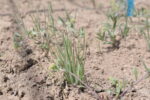 western.sare.org news restoring-rangeland-back-to-the-future
western.sare.org news restoring-rangeland-back-to-the-future Restoring Rangeland Back to the Future
Massive wildfires are on the rise throughout the West, reshaping plant communities and endangering native grasses that are a key source of forage for livestock. Reseeding with locally sourced seed is a common rangeland restoration strategy, but climate change raises an interesting question: What’s the best way to heal the land when its future environment […]
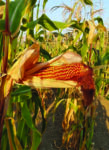 western.sare.org news researchers-work-to-develop-test-dry-farm-adapted-corn-varieties
western.sare.org news researchers-work-to-develop-test-dry-farm-adapted-corn-varieties Researchers Work to Develop, Test Dry-Farm-Adapted Corn Varieties
As farmers and agricultural researchers work to adapt to changing climatic conditions, some are looking to future innovations, some are exploring past agricultural practices, and some are doing both. In Western Oregon, a collaborative effort to establish and expand dry farming – growing crops without irrigation – is decidedly in the “doing both” camp. “There […]